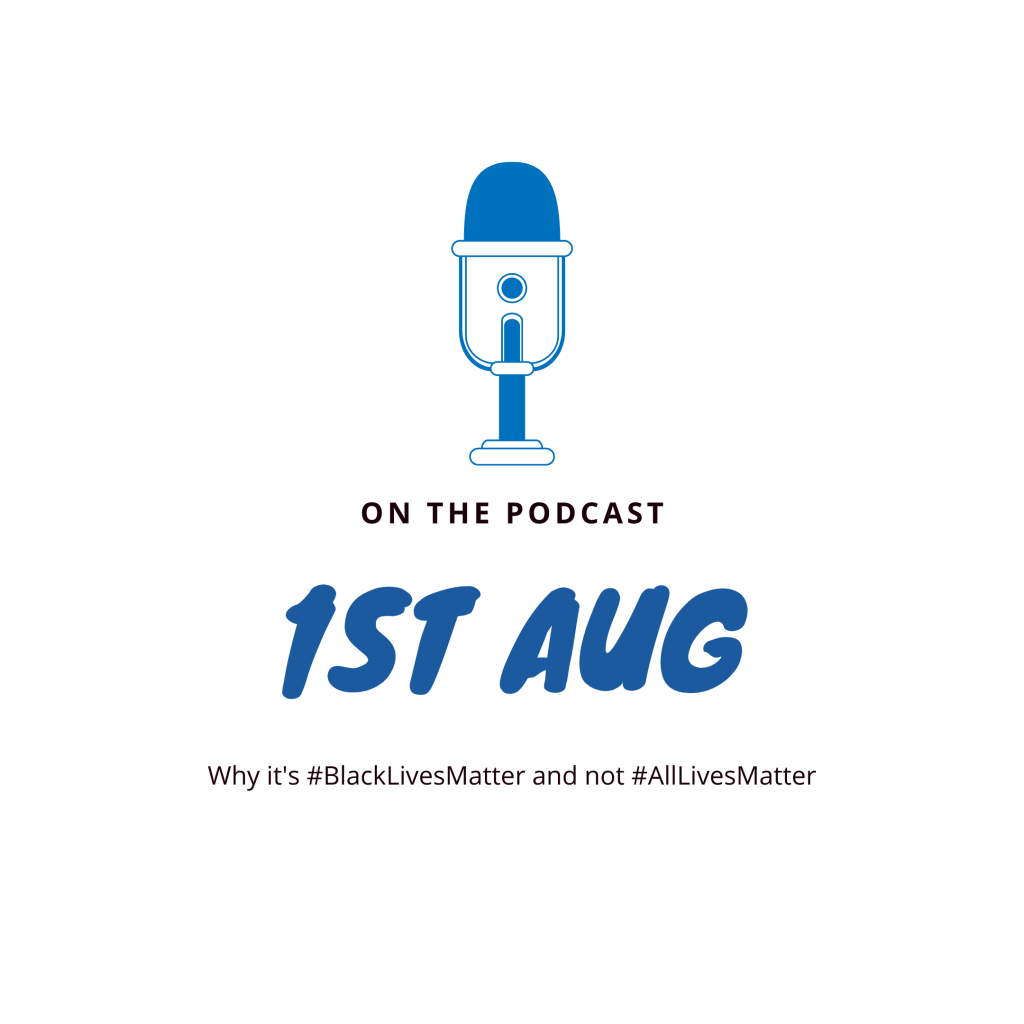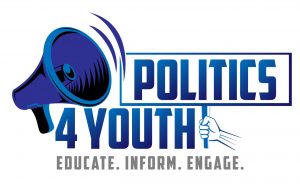
All the sources used in the making of the 23rd of July podcast episode.
You can listen to this podcast here.
Why it’s #BlackLivesMatter:
https://inews.co.uk/news/uk/all-lives-matter-why-dismissive-racism-black-people-441086
Why I am no longer talking to white people about race, Reni Eddo-Lodge
Text from the episode
As a white woman, I have never experienced racism and I don’t record this episode with any attempt at implying that I have. I will never understand how it feels to be prejudiced simply for the colour of my skin, but I do understand that this is an issue that affects other people here and around the world.
As the founder of Politics4Youth, I am determined to use our platforms to discuss issues that prevent young people from being afforded equal opportunities and nothing signifies that more than the issues that young – and older – black people are facing at this moment in time.
There is substantial data and statistics to prove that racism exists in the UK, both systematic and societal but there is even more evidence if we take the time to listen to the lived stories of those that have been directly affected. Because while statistics and data matters – and have a huge role to play in politics – it’s the lived experiences that help us to understand what people are actually experiencing.
Black Lives Matter, as a movement, is more important than ever and as an educational platform that aims to help young people understand the goings on of the world, we thought this was a hugely important topic to cover.
Because it’s only through understanding, awareness and knowledge that we can actually chose to do things better.
In today’s episode, we talk about the Black Lives Matter movement and why using the alternative hashtag, all lives matter, is undermining everything that BLM stands for?
Podcast introduction
Hello and welcome to the Politics4Youth podcast, I’m Kay, you’re host and the founder of Politics4Youth. Our aim is to offer content that is engaging, educational and empowering, giving you the basic, stripped back, no-BS information that you need to make good political decisions and to involve yourself in important debates.
On this podcast and over on our Instagram, we tackle current affairs and politics, offering a fresh unbiased approach. We bust traditional taboos about off-limit areas of conversation and seek to encourage you to have these informed and important conversations in your own lives.
Whatever your politics, you have a place here. Right, let’s get in to today’s episode.
I have thought long and hard about the best way to start this segment but perhaps before we attempt to understand why the term ‘all lives matter’ is offensive at worst and dismissive at best, it’s worth briefly considering the history of the Black Lives Matter movement.
The term Black Lives Matter was first used in 2013 following the death of Trayvon Martin and the subsequent acquittal of the man who killed him. Trayvon Martin was a 17-year-old black man, who lived in Miami Gardens Florida. On the day of his death, the 26th of February 2013, Martin had spent the day at home of his father’s fiancée and that evening he visited a convenience store. On the way back from the store he encountered, George Zimmerman, a local neighbourhood watch volunteer.
Despite not doing anything criminal, Zimmerman called the Sanford police on Trayvon and reported that Trayvon was ‘suspicious’. A short while later, Trayvon was fatally shot in the chest.
Initially, no charges were even brought against Zimmerman, as it was argued that there was nothing to disprove his suggestion that he had acted in self-defence. The police claimed that under Florida’s stand your ground law, Zimmerman had acted fairly.
The stand your ground law allows someone who is threatened to take action in order to protect themselves or their property. However, it is often used as a defence when lethal forced has been unduly used.
There is no evidence that Trayvon was doing anything illegal.
Following mass media coverage, Florida did eventually place Zimmerman on trial, but he was eventually acquitted of both second-degree murder and manslaughter.
It was this case that saw the Black Lives matter hashtag being widely used for the very first time and it is the moment that the movement was first born.
However, it was in 2014, following another senseless death that the movement truly gained its momentum.
In 2014, 18-year-old Michael Brown was killed by 28-year-old police officer Darren Wilson, having been shot six times. While Wilson argued that it was all in self-defence, Brown’s friend – who was with him at the time – entirely disputed his version of events. Following a grand jury consideration of the case and the evidence, Wilson was not indicted.
Since then, the hashtag has become widely used and is usually a sign that something unjust has happened somewhere in the world.
Yet while Black Lives Matter has been around for over half a decade, 2020 feels like a watershed moment. There’s no doubt about it 2020 has been a hard year but it’s shone the spotlight on the injustice and inequality that still exists in society.
Whether it’s the increased number of BAME people who have died from coronavirus. The murder of Ahmed Abery and the subsequent mistreatment of the investigation. Or the abhorrent, sickening and cold-blooded murder of George Floyd, 2020 has shown us that we have much further to go and much more to do to ensure that every life is valued and that every life is afforded the same protections, opportunities and rights.
Black Lives Matter is as important now, in 2020 as it was in 2013 and that’s why it’s important that we don’t attempt to dismiss or undermine the cause itself.
Every time that Black Lives Matter trends, so too does All Lives Matter and there’s something incredible problematic about this distraction.
The truth is that most people using the phrase ‘all lives’ matter mean it with the best of intentions but without intending to or without knowing so, they are inadvertently dismissing the issue at the very heart of the black lives matter movement. But to deny that race matters is to entirely undermine the exact issue that most needs to change. And it also serves as a shoulder shrug to those who’ve experienced racism firsthand.
In her fantastic book on racism, it’s history and how it manifests in the 21st century, Reni Eddo-Lodge perfectly summarises and highlights the issues that are brought about by attempts to remove ‘race’ from how we currently view and see society. Although in most cases coming from a place of hope, the all lives matter hashtag entirely detracts from the injustices that the movement seeks to correct.
In her book, Eddo-Lodge says that:
QUOTE ‘It starts and ends at ‘discriminating against a person because of the colour of their skin is bad’, without any accounting for the ways in which structural power manifests in these exchanges. With an analysis so immature, the definition of racism is often used to silence people of colour in attempting to articulate the racism we face. When people of colour point this out, they’re accused of being racist against white people, and the accountability avoidance continues. Colour-blindness does not accept the legitimacy of structural racism or history of white racial dominance.’ END QUOTE
For most of us, all lives matter is the end goal that we are striving to obtain but in 2020, it’s not a statement that can currently ring true.
Right now, all lives matter is the end goal that we are hoping to one day realise but it offers little comfort or progress for the black community. The black lives matter movement, on the other hand, is a solution focussed movement. A movement that was born from an issue with real and achievable goal at the heart of what it does.
In her article The Turnout in 2015, Alicia Garza furthered emphasised just how much judged it is to attempt to alter the wording of the Black Lives Matter movement.
“What it is, is a demonstration of how we don’t actually understand structural racism in this country. When we say All Lives Matter, that’s a given. Of course, we’re all human beings – we all bleed red – but the fact of the matter is some human lives are valued more than others, and that’s a problem.”
A few weeks ago, I created an Instagram post that used statistics to demonstrate that the Black Lives matter movement was as important here as it is in any other part of the world. Because statistics, while they can be swayed and misused, are an important tool for helping us understand the national picture.
Unsurprisingly, I received a fair few comments disputing the claims made but statistics are a vital part of the story and they help us understand the ways in which Black people are still not given parity in British society.
And in particular, they help us to understand the ways in which not all lives matter equally at the moment.
- Black mothers are five times more likely to die in childbirth than any other race.
- Black people are three times more likely to be detained under the Mental Health Act.
- In 2017-18, black households were more than five times more likely to be designated ‘statutory homeless’ in England.
- Between April 2018 and March 2019, there were 38 stop and searches per 1000 per black people, as opposed to four per 1000 for white people.
- Black woman are twice as likely to be arrested than white woman.
These are all issues which shows the everyday barriers that black people face, and the solution has to fit the problem. This is a race issue and it requires a race focussed solution.
It’s no different to the suggestion that we should be blind to race, or that race doesn’t matter, because they’re sentiments that are well intended but not in line with current lived experiences.
Black lives matter is a statement that demands it be brought to truth.
It’s a rallying call, a cry for justice and a demand that black people be treated equally.
While all lives matter to me and you and probably most people listening to this podcast or following our socials, for a significant amount of people, some lives matter less than others.
All lives matter is a statement for the future, a statement for when the battle is won and for when every person is afforded the respect and rights that they rightly deserve, regardless of their race, class, sex or sexuality. It’s a statement that we should all be striving for but not one that should be used in anything other than an idyllic sense right now.
All lives matter is an idealism that we all hope will be truth one day, but until then, until black lives matter, not all lives matter.
For Ahmad Arbery, Sandra Bland, Breona Taylor and George Floyd. For Sean Rigg, Mikey Powell, Kingsley Burrell, Sheku Boya. For Stephen Lawrence who has only hard half the justice he deserved.
For all those lives lost and the many more we risk by inaction, this differentiation matters.
I want to finish this section of the podcast by once again borrowing from Reni’s excellent book because it perfectly sums up the negative implications of removing race and why the difference between the two hashtags matter.
‘In order to dismantle unjust, racist structures, we must see race. We must see who benefits from their race, who is disproportionately impacted by negative stereotypes about their race, and to who power, and privilege is bestowed upon – earned or not – because of the race, their class, and their gender. Seeing race is essential to changing the system.’
Outro
Thank you for listening, be sure to leave us a review if you enjoyed and make sure you subscribe so that you never miss any future episodes.
If you want to know what you can do to support us or are interested in getting involved, make sure you check out our website which is linked in the show notes. For more content be sure you check our our Instagram.
See you next week.



